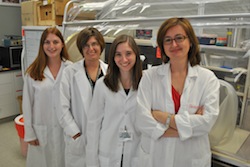 Researchers at Michigan State University (MSU) are using the power of microbes from agricultural waste to create ethanol and hydrogen for fuel cells. The technology was developed by MSU microbiologist Gemma Reguera, who created bioelectrochemical systems known as microbial electrolysis cells or MECs. The process uses bacteria to break down and ferment ag waste into ethanol. The process produces 20 times more energy than existing methods.
Researchers at Michigan State University (MSU) are using the power of microbes from agricultural waste to create ethanol and hydrogen for fuel cells. The technology was developed by MSU microbiologist Gemma Reguera, who created bioelectrochemical systems known as microbial electrolysis cells or MECs. The process uses bacteria to break down and ferment ag waste into ethanol. The process produces 20 times more energy than existing methods.
According to communication from MSU, the process is unique because it uses a second bacterium. When added to the mix, it removes all waste fermentation byproducts or nonethanol materials, while generating electricity. The results of the research were recently published by Reguera along with co-author and graduate student Allison Spears, in Environmental Science and Technology.
The research is important because in lab tests have significantly improved energy recovery from corn stover, a budding feedstock for biofuel production, that today hovers around 3.5 percent. However, Reguera’s process averages 35-40 percent energy recovery after factoring in the energy required during the pretreatment phase. What might be even more promising about the platform is that the significant energy recovery is just from the fermentation process.
“This is because the fermentative bacterium was carefully selected to degrade and ferment agricultural wastes into ethanol efficiently and to produce byproducts that could be metabolized by the electricity-producing bacterium,” explained Reguera.
“By removing the waste products of fermentation, the growth and metabolism of the fermentative bacterium also was stimulated. Basically, each step we take is custom-designed to be optimal,” she added. 
The second bacterium generates electricity, which is used to generate hydrogen in the MEC to increase the energy recovery process even more. “When the MEC generates hydrogen, it actually doubles the energy recoveries,” she said. “We increased energy recovery to 73 percent. So the potential is definitely there to make this platform attractive for processing agricultural wastes.”
The platform leverages an advanced pretreatment technology for the corn stover developed by well known biofuels researcher Bruce Dale, who is also a professor at MSU.
The next step for Reguera is to optimize the MECs so they can be scaled up to commercial levels.

